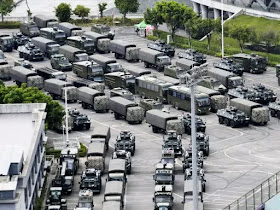Still, it is bigger than this, civic groups and small businesses have joined in at times with general strikes and school boycotts to “defend Hong Kong.” This started over an amendment that included a mechanism for extraditions to mainland China that triggered fears that Beijing could detain people in Hong Kong and try them on the mainland under China's more opaque legal system. Mounting opposition has stirred from all corners of society, including business-people, lawyers and activists, who say the bill would undermine Hong Kong’s relative autonomy and independent judicial system.
While you might want to consider the idea Hong Kong has no future as simple doom porn certain social and economic factors are coming together that paint a picture devoid of hope. For the protesters, this has become a damned if you do damned if you don't situation. While Hong Kong is considered a city by most people, it is officially the Hong Kong Special Administrative Region of the People's Republic of China. With over 7.4 million people of various nationalities in a 1,104-square-kilometre territory. it is one of the most densely populated places in the world. For many years the area flourished as a tax haven for the British and European elite. The continued viability of Hong Kong was questionable even before the Brits turned it over to China.
 |
| Hong Kong Is Most Likely Doomed |
The rise of totalitarianism and Orwellian rule is surging across the globe with governments nibbling away the rights of the individual for the "greater good". Technology is key in employing tools such as facial recognition and keeping records of our communications. This includes things like China's social scoring program that rewards and punishes citizens for their behavior. Adding to tensions, the United States Senate unanimously passed the “Hong Kong Human Rights and Democracy Act of 2019”, and the House of Representatives then passed the same bill by a 417 to 1. The Chinese consider this a slap in the face and an assault on their sovereignty.
Circling back to Hong Kong, a big problem is that as the protests turn violent it gives China justification to lower the hammer and crush those standing against it. This, of course, would be done "for the greater good." The narrative that the protesters are destroying businesses, companies, shopping malls, subway stations, and the economy is difficult to dispute. The decline in tourist stands as a testimony this has effected Hong Kong's hard-earned reputation as a safe international business center.
It is logical to think that China has been busy gathering information on its enemies in Hong Kong and even if protests subside China will be slow to forget what they have done. This means Hong Kong is living under a cloud and most likely China will work hard in coning years to diminish its future by always putting other areas first, call it discrimination if you like. In a study, the Hong Kong Institute of Asia-Pacific Studies asked 707 individuals by phone in late September if they would leave the city because of the turmoil. More than 42% answered yes, this is up from 34% last December. Almost a quarter of these respondents claim they have started plans to leave which includes things like getting out of housing leases, selling their homes and cars, and packing up their possessions.
The political chaos was the most significant element triggering a desire to move. The two largest factors being "too much political dispute or social cleavage" (27.9%) and "no democracy in Hong Kong" (21.5%). Adding to the desire to flee was the fact about 20% of the respondents had no confidence that China or Hong Kong would address overcrowded living conditions. Unfortunately, it is generally those with the best education and most money that have the option to actuality leave. This increases the possibility that the area will suffer financially over the long run as capital and wealth take flight to areas with better prospects.
 |
| Chinese Troops Have Assembled Near By |
The claims the Chinese Communist Party (CCP) and China’s economy would pay a terrible price for a brutal assault may be overdone. We should remember the protesters have been painted as violent thugs going forth every day to harm the economy and other Hongkongers. The big question is whether China moving in and hammering the protesters into submission will trigger a war. If so, such a war has the potential to go global with a great number of nations weighing in. Still, how could you come to the wayward territory's defense? It is both far away and impossible to defend. For Trump and America to draw a line in the sand and not carrying through would be most embarrassing indeed.







